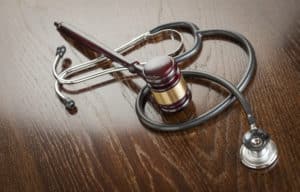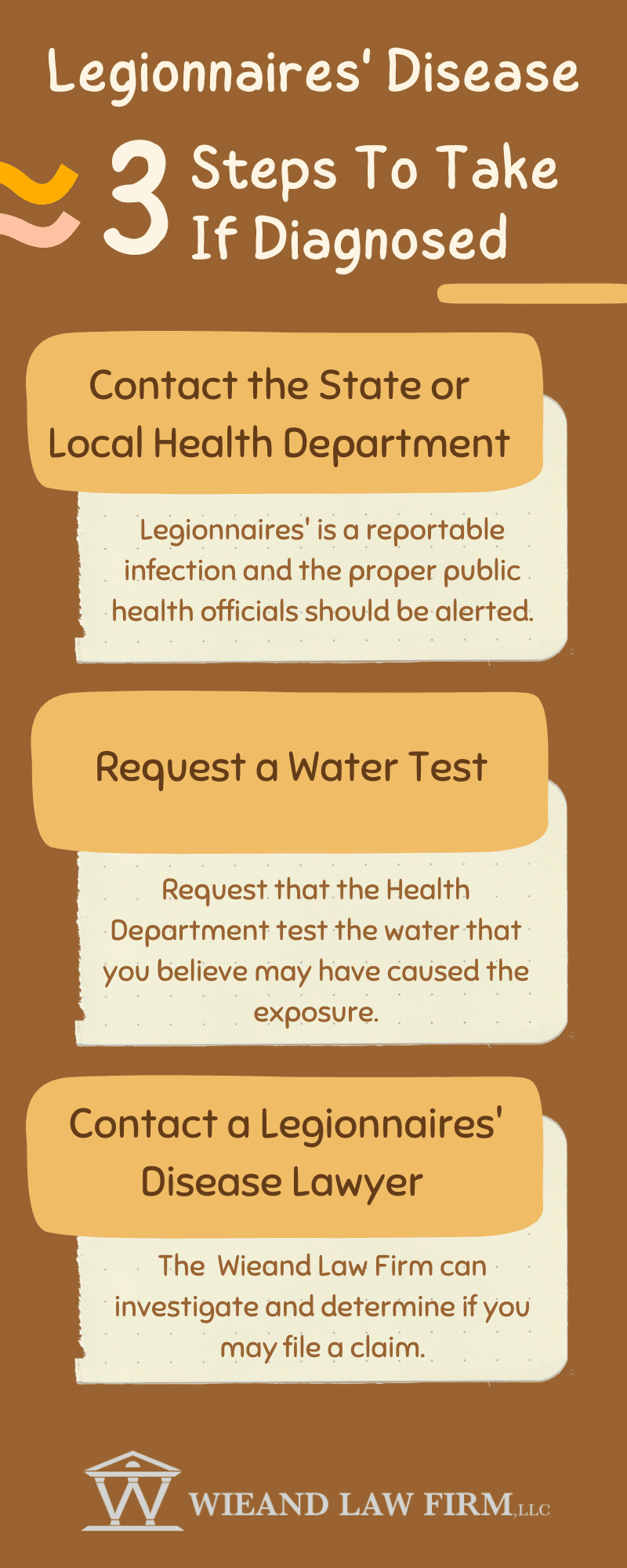 An outbreak of Legionnaire’s disease in a nursing home or health care facility deserves the attention of a Legionnaires’ disease lawyer. Legionnaires’ disease is a serious lung infection caused by inhaling in water containing a bacterium, Legionella pneumophila. These bacteria prosper and multiply in moist environments, such as plumbing and HAVC systems in our nations nursing homes. If your loved one has contracted Legionnaires’ disease while a resident of a nursing home or health care facility, a Legionnaires’ disease lawyer at our firm can help.
An outbreak of Legionnaire’s disease in a nursing home or health care facility deserves the attention of a Legionnaires’ disease lawyer. Legionnaires’ disease is a serious lung infection caused by inhaling in water containing a bacterium, Legionella pneumophila. These bacteria prosper and multiply in moist environments, such as plumbing and HAVC systems in our nations nursing homes. If your loved one has contracted Legionnaires’ disease while a resident of a nursing home or health care facility, a Legionnaires’ disease lawyer at our firm can help.
Legionnaires’ disease is a type of pneumonia that is caused by bacteria. When a nursing home fails to maintain and address problems in the plumbing and heating systems, these bacteria can thrive. Nursing home residents who inhale or ingest the contaminated water can be exposed to the bacteria and contract Legionnaires’ disease.
A resident typically starts to show symptoms 2 – 10 days following their exposure. These symptoms can include a high fever, chills, cough, and muscle pains. Additional symptoms such as coughing up mucus or blood, chest pain, and shortness of breath are common as the disease progresses. While Legionnaires’ primarily affects the lungs, it can also cause heart infections.
If your loved one has suffered from this infection while a resident at a nursing home, it is advisable to contact a Legionnaires’ disease lawyer to see if you may be eligible for compensation. Legionnaires’ disease is a serious infection that frequently has severe medical complications. A Legionnaires’ disease lawyer could seek compensation if these medical expenses occurred due to another party’s negligence.
Legionnaires is frequently missed; in fact, it is believed that up to 90% of cases are mistaken for other infections, such as SARS, left ventricle failure, or other types of pneumonia. Legionnaires’ can be diagnosed with different laboratory tests such as PCR, cultures, and a urinary antigen test.
Once diagnosed, Legionnaires often requires treatments with antibiotics. While many people can be effectively treated, those who are at high risk may suffer complications and require hospitalization. Complications from Legionnaires’ Disease includes septic shock, respiratory failure, and kidney failure. Legionnaires’ is very serious and in some cases it can be fatal. So, it is important to seek proper medical attention if you suspect or have been diagnosed with this illness.
Legionnaires is a serious lung infection that is especially harmful to the elderly, people with underlying medical conditions, and those with weakened immune systems. The Centers for Disease Control and Prevention (CDC) estimates that 10% of people who contract Legionnaires’ will die from complications of the illness. This number is much graver for elderly nursing home residents. Residents of nursing homes and other health care facilities who contract Legionnaires’’ during their stay have a staggering 25% death rate. If your loved one has been diagnosed with Legionnaires’ disease, contact a Legionnaires’ disease lawyer at the Wieand Law Firm to help determine who can be held responsible for their injuries.
High risk residents include:
On June 2, 2017, The Centers for Medicare and Medicaid Services (CMS) issued a memo requiring health care facilities to implement a water management program to minimize the risk of Legionella proliferation in facility water systems. In this memo, CMS detailed that a 19% of Legionnaires’ disease outbreaks over a 4-year period between 2000 – 2014 occurred nursing homes, and an additional 15% of outbreaks occurred in hospitals. The Pennsylvania Health Care Associate estimates that 4 out of 5 cases could be prevented with an effective water management program.
Additionally, federal regulations require that nursing facilities require facilities to have an infection prevention and control program. Guidance from the State Operations Manual 42 CFR §483.80 includes:
“The facility must establish and maintain an infection prevention and control program designed to provide a safe, sanitary and comfortable environment and to help prevent the development and transmission of communicable diseases and infections.”
In 2015, nearly 550 cases of Legionnaires’ disease occurred at a nursing home or health care facility. Outbreaks in these types of health care institutions put highly susceptible and medically fragile patients at high risk of a devastating illness. Many of these infections could have been prevented with proper maintenance of facility water and HVAC systems.
A nursing home may be held liable when they failed to follow standards and implement a water management program and residents, staff or visitors became sick with Legionnaires’ disease as a result. A Legionnaires’ disease lawyer can hold nursing homes and hospitals accountable when they fail to maintain their facility’s plumbing and HVAC systems, and a resident contracts a preventable infection.
To prove liability for a Legionnaires’ infection, the claimant must show that:
These cases can be complex and may have multiple potential defendants. For example, the nursing home is one potential defendant. However, contractors who service the water system of the nursing home may also have liability. Therefore, it’s advisable to seek the services of a Legionnaires disease lawyer who is knowledgeable about these types of claims. They can help start an investigation and determine which party or parties may hold liability in your specific situation.
Receiving a diagnosis of Legionnaires’ disease can be alarming and worrisome for patients and their families who understand the severity of this infection. Families often don’t know where to turn or what action to take next. We advise to take the following steps.
 How can a Legionnaires’ Disease Lawyer Help?
How can a Legionnaires’ Disease Lawyer Help?A lawyer from our firm can be a valuable representative and advocate for you during this time. A seasoned Legionnaires lawyer will start an investigation at the facility where the exposure is presumed to have occurred. This investigation will include interviewing other victims, such as employees or other residents that have been sickened, as well as witnesses. Your attorney can retrieve reports completed by the health department or other agencies who are investigating. A lawyer will certainly explore whether a water management program was in place and review any supportive documentation about servicing of the water system. They can also help retrieve a copy of your medical records from treating health care facilities.
In these types of cases, a lawyer will often seek out relevant experts to provide opinions and insights about the validity of your claim. These experts may include a physician, an infectious disease expert, or an industrial hygienist. As your case progresses, the lawyer will negotiate with the defendants and their insurance companies to seek the maximal possible compensation for your injuries. In some cases, the lawyer will represent you in the courtroom before a judge.
The lawyers at our firm work on a contingency fee basis. That means that we don’t collect a fee unless we win money for you. This allows you to focus on taking care of your loved one instead of worrying about how to afford costly attorney fees. If you decide to proceed with using our law firm for your case, we will review our agreement with you in depth and answer any questions that you may have about the contingency fee agreement. Our attorneys are committed to full transparency in regard to our fees.
 Contact a Legionnaires’ Disease Lawyer at the Wieand Law Firm, LLC Today!
Contact a Legionnaires’ Disease Lawyer at the Wieand Law Firm, LLC Today!Call the Wieand Law Firm today to speak directly with an attorney about your case. We will listen to your situation and take the time to discuss your legal options. While our lawyers are aggressive litigators, we are committed to treating our clients with care and compassion. This means that we are committed to providing thorough communication and updates about your case.
Our goal is always complete client satisfaction with our services, and we encourage you to view our testimonials page to view video feedback from our previous clients.
Call The Wieand Law Firm today at 215-667-7777 or send us a message through our website form to get started.
